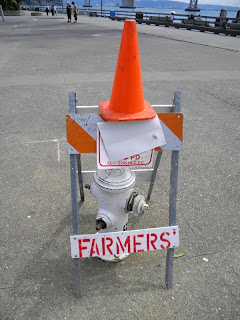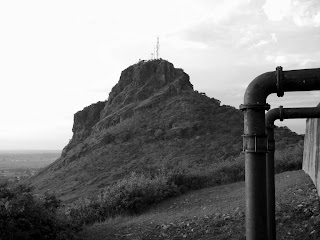
Before we boarded the train Ellen insisted we purchase a bottle of wine at a supermarket, though her cogency was unnecessary: this sort of thing I very rarely object to. So, giddy with anticipation, we tuk-tuked to the Mombasa train station and prepared to board the train. I enjoyed even the wait immensely. Rusting old train cars sat sporadically throughout a network of weedy tracks, ignored by everyone and everything save my camera lens. To the west, tracks pointed toward a setting equatorial sun. An old notice board, paint peeling and dirty, with departure times and passenger listings suggested a long lost popularity with rail travel or even an African administrator’s tendency to abandon organizational pedantry. We had some time to kill before the train left, so Ellen and I sat down on a bench outside and drank some water. A Kenyan man playing a guitar and singing soon made his way over to where we were sitting, and I offered him 100 shillings, which turned out to be one of the better decisions I had made in some time. Strumming on a guitar that outstripped the decrepit train cars littering the yard in age and wear, he belted out one of the greatest songs about Kilimanjaro I have ever had the pleasure to listen to. A few additional coins from our pockets and he brought out the big gun, a croony love song about two lovers who underappreciated each other. With his last note we boarded the train, and settled into our miniscule birth. I was hoping for mahogany paneling and a cabinet full of aged scotch, maybe even a chandelier, but was slightly disappointed. Our cabin was not the colonial relic I was hoping for, instead, that sickly orange paint only popular during the 1970s coated the walls and a miniscule sink area and cabinet offered, no, not liquor, but a drinking tap that didn’t work. Never mind, dinner was next on the docket; a promised three course meal with silver cutlery and china.

Dinner was quite an adventure. The train’s jostling seemed ill-suited for stemmed wineglasses, but we managed to finish off the whole bottle with only a little spillage. The cuisine was not spectacular, but the fact that we got three courses of mediocre food was enough to make me happy. Due to limited space in the restaurant car, we were obliged to sit with our fellow passengers. An elderly woman with a large splint on her forearm was directed to sit with me and Ellen at our table, but took one look at us and deemed us too young to engage in the type of sophisticated conversation she preferred. She eventually acquiesced, and joined us. We promptly offered her a glass of wine, which she refused, for she was on medication for her arm. Apparently an under-serviced matatu tire had spun lose from its axle and became airborne, hitting her in the wrist while she was in the village doing her PeaceCorps work. I can picture the scene in my head quite easily, actually, now that I have logged so many hours in public transportation in Africa. It is a rather funny image, I admit: the skinny, leathered American woman screaming in pain while the matatu driver and conductor simultaneously console her, apologize and repair the damage, and then offer her a free ride to the hospital in the newly fixed vehicle.

After dinner and the bottle of wine we retreated to our cabin, where a hand had made up our beds for us. They looked pretty inviting at first. Upon going horizontal, however, the train’s jostling became even more pronounced, and I suddenly understood why the upper bunk had a removable safety strap. Despite the rough ride, I managed to eke out a decent night’s sleep. Ellen, however, was not so lucky, and I awoke to a disheveled, bloodshot face gazing out the window. One of the great things about my friend is that she doesn’t require 8 solid hours to maintain her upbeat attitude. (Back in college I used to give my roommate Jim a lot of guff for sleeping in long hours on the weekends and requesting only afternoon classes, until I discovered that an unrested Jim is scarily silent and resembles a youthful mad scientist who has exchanged his bloody frock for sweat pants. Sleep away, Jim, please sleep away.)

Breakfast was also rather sad, as far as the palate is concerned. Toasted Wonderbread with strawberry jelly and long-life margarine, two eggs in the limbo stage between over-easy and scrambled, and, the centerpiece, a lone two-inch piece of defrosted sausage. The views over breakfast, on the other hand, were excellent. Unlike in Uganda where every square meter of land along a road or pathway is lived on or cultivated, Kenya still contains sizeable stretches of unprotected, wild territory. Form the train’s streaked windows we saw ostriches, zebras, waterbuck, and about 700 varieties of antelope. While breakfasting we were fortunate enough to experience another colonial fixture that has persisted to the twenty-first century: the ancient white European with an extremely young and beautiful African wife. Recall Theroux’s comment about train passengers. The couple that joined us is everywhere in East Africa, from the beaches of Mombasa to the trendy cafes of Kampala, it even shows up faithfully at the swimming pool in Mbale every Sunday with its two children. The wife is always dressed to the nines -- after all, if you have managed to land a mzungu husband and become intimate with the Pound Sterling, you must alert everybody’s attention to your good fortune. The husband is always looking rather pale and wrinkled, which he likes to advertise by wearing very short shorts and rafting sandals, and carries with him a very amiable character and lots of high-powered sunscreen. The children, though not accompanying their parents on this particular train ride because they are attending a fancy boarding school, are both the wife’s from a previous engagement.

Almost exactly as scheduled, the train pulled into Nairobi Central Station around 8 am. The giant, aging steel wheels came to slow but quiet halt. Tall skyscrapers, claimed by the Kenyatta International Conference Center, Barclays Bank, the Hilton, DFCU, even the elevated gables of the State House rose upward from just beyond the station fences only a five minute walk away-- the train had brought us to the center of East Africa’s most important city. It seemed odd that such a lumbering, relic of colonialism still maintained such excellent real estate. Surely, in any other city, a fledgling railway, struggling even to repair the ceramic ceiling fans in its restaurant car, would have no place in such an environment. Yet, surprisingly, it appears as though Nairobi Central Station and the Rift Valley Railway are there to stay; a testament to British Imperialism, yes, but, I think at a more deeper level, a statement to remind people that travel for thirteen hours doesn’t have to be a terrible inconvenience, it can be an experience. Just sit back, drink a glass of wine or two, and enjoy.

























































